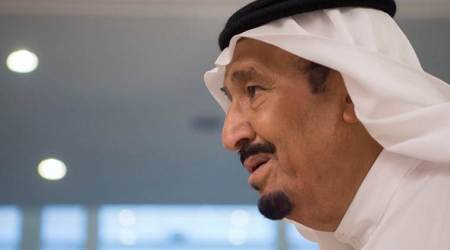 Saudi Deputy Crown Prince Mohammed bin Salman. (File photo)
Saudi Deputy Crown Prince Mohammed bin Salman. (File photo)
On July 18, the global media carried stories of how Saudi crown prince Mohammed bin Naif was ousted from his position and replaced by his cousin, deputy crown prince Mohammed bin Salman.
The reports said that in the previous month, on June 20-21, the Saudi monarch, King Salman bin Abdulaziz, had summoned the crown prince for a meeting in Mecca. The monarch told the prince that he had refused to take treatment for his addiction to pain-killers, which had impaired his judgement. He then asked the prince to step down and make way for his son and Naif’s deputy, Mohammed bin Salman.
Soon thereafter, the ousted crown prince was confined to the room, deprived of his mobile and denied outside contact, while his personal guards were replaced. Then, a letter from the king was read out to each member of the Allegiance Council, the 37-member body of princes empowered to approve the appointment of the crown prince, which mentioned the prince’s addiction and asked that he be relieved of his position and Mohammed bin Salman be appointed in his place.
The responses of support (34 out of 37 princes) were recorded and played before the crown prince, finally persuading him at day-break that he had no support within the royal family. He accepted his downfall, signed the resignation letter, and, on his way out of his temporary confinement, found his replacement waiting for him: television cameras captured the poignant moment when the new crown prince humbly kissed the hands of his predecessor and accepted his good wishes.
There are persistent reports that the former crown prince is under house arrest, though these have been firmly denied by official Saudi sources.
Unprecedented developments
The extraordinary reports of Mohammed bin Naif’s removal have been ascribed to sources close to him. With these background briefings, the ousted prince is perhaps hoping to convey to his compatriots that he has been punished for taking pain-killers to alleviate the consequences of the suicide attack upon him in August 2009 by an Al Qaeda zealot, who was pretending to be part of the prince’s de-radicalisation programme. The bomber had then got close to the prince and blown himself up, while injuring the prince. If these reports are from sources close to him, it would affirm that the former crown prince is deeply unhappy at his removal.
Recent developments relating to the Saudi royal family, when two crown princes have been ousted to make way for a young son of the monarch, who now has untrammelled personal authority in political, economic, defence and intelligence areas, have no precedent in the family’s history over the last six and odd decades.
Royal decision-making has generally been consultative and collegial; this has enabled the family to maintain unity in public, provided cohesion to state policy and enabled the royal house to weather several storms. This includes an abdication, the attack on the Haram Sharif in Mecca, jihad promoted by Saudi national Osama bin Laden and the 9/11 attacks in which several of its citizens were implicated.
Above all, royal family matters have been scrupulously kept out of the public domain, with the 30,000-strong family maintaining a studied public silence on internal debates and differences. The briefings behind the recent reports indicate that although the king persuaded most princes to back the change in favour of his favourite son, there remains considerable unhappiness in sections of the family and the citizenry at the power and influence enjoyed by one prince, who is widely seen as inexperienced, impulsive and haughty and is heading two unwinnable wars, in Syria and Yemen.
Security revamp
Within a few days of the reports inspired by the ousted prince’s aides, there is news of a major revamp in the country’s security and intelligence setup. A new Presidency of State Security has been set up, and is attached to the prime minister’s office, not the interior ministry, along with several other security and intelligence departments.
General Abdulaziz Mohammed al- Huwairini has been appointed Chief of State Security, with the rank of minister, while continuing in his post as Director General of General Intelligence. He has been a long-time associate of Prince Mohammed bin Naif and was widely believed to be under house arrest, along with his former chief. His appointment suggests an outreach by the new crown prince to senior professionals associated with the former crown prince to avoid nurturing centres of disgruntlement and hostile intrigues.
Given that the Saudi monarch is both head of state and prime minister, it is also interesting to note that the new security presidency has been specifically placed under the “prime minister” and not the royal court. This suggests that the two offices of head of state and head of government will shortly be bifurcated and the crown prince, Mohammed bin Salman, will be designated prime minister, going back to 1953 when then Crown Prince Faisal was designated prime minister by King Saud; the two offices have remained merged since King Faisal became the ruler in 1964.
These new arrangements seem to have the blessings of the Trump presidency: even as these important changes were taking place in Riyadh, the State Department released a statement praising the strong US-Saudi counterterrorism partnership. The content and timing of the statement suggest that, despite the US’s close ties with the former crown prince, it now supports the rapid elevation of Mohammed bin Salman.
The new Crown Prince has established close ties with President Trump, his son-in-law, Jared Kushner, and the administration’s senior security officials, who see the prince as a moderniser and a solid ally against Iran. This is an important partnership since the prince will need all the help he can get in those uncertain days when his father leaves this mortal world.

